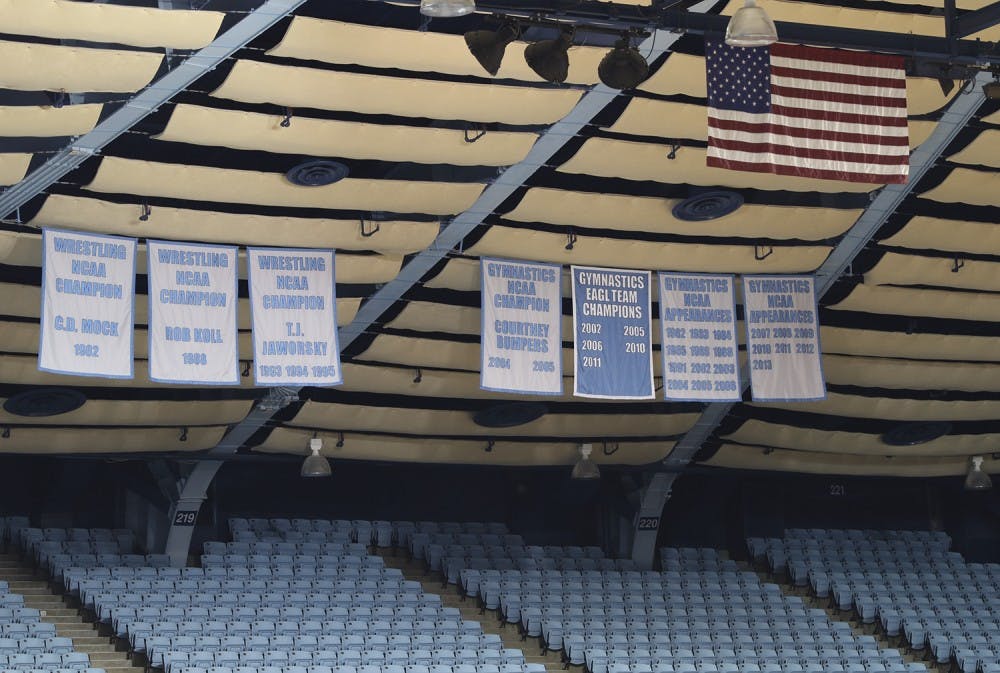In late September, the senior and his Virginia men’s basketball teammates knew they wanted to take a stand. So they talked in group chats and post-practice meetings, looking for the right way to support Kaepernick and his message.
On Sept. 29, Perrantes posted a picture on Instagram of the team wearing all black, linking arms and kneeling on the Cavaliers’ logo.
“That was the only way we felt that we can get people’s attention ...” he said. “When you create conversation, a lot of people take actions with it.”
UNC players have made similar, but less public, protests.
During the football team’s win over James Madison, senior Ryan Switzer threw his fist in the air. Six days later, players joined a campus protest against racial violence.
“We’re just showing support to the Black Lives Matter movements and trying to help out any way we can,” sophomore Andre Smith said.
But some student-athletes prefer to avoid the personal and professional ramifications of protesting, while others want to avoid bringing controversy to their team or school.
“I don’t think it’s our place right now,” said Jerome Robinson, a sophomore on the Boston College men’s basketball team. “We’re representing something more than ourselves.”
Many athletes, college and professional, have stayed silent on social issues over the years. North Carolina alum Michael Jordan was notoriously quiet about political issues, and few athletes in recent years demonstrated publicly before Kaepernick.
To Pittsburgh men’s basketball senior Sheldon Jeter, silence is part of the problem.
“The reason why some kids grow up not knowing what’s going on is because they look at athletes who don’t ever talk about stuff ...” he said. “I just feel like you’ve got to take the responsibility to speak up as an athlete.”
***
To get the day's news and headlines in your inbox each morning, sign up for our email newsletters.
Larry Fedora wasn’t doing enough.
Every offseason, local police officers come to campus to meet with the football team.
But this season, the UNC football coach organized a luncheon to build camaraderie between the players and officers. He saw it as a chance for the players to see the officers as ordinary people — and for the officers to see the players in the same light.
“I really was upset with myself because I didn’t feel like I’ve done enough in the past to foster those relationships that we need ...” he said. “So I was much a part of the problem as anybody for the last four years. And so I wanted to be a part of the solution.”
While Williams had brought in police officers to speak with the team in the past, it was never to address racial tensions in America. But after incidents of police violence across the country — including in Charlotte — he changed the tenor of the meeting.
“A lot of people of my color are scared if we were to get stopped by a cop,” said junior Joel Berry. “So they came in and talked to us about what to do: two hands on the wheel, just in case, when in doubt they’ll know that you don’t have anything in your hands ...
“I didn’t have a problem with it at all, and I don’t think anyone on our team did.”
It’s not just at UNC.
Coaches for the Virginia, Boston College and Miami men’s basketball teams have brought in police chiefs and town officials to speak with their teams.
In addition to meeting with the local police chief, Miami coach Jim Larrañaga called his team together to discuss civil rights issues such as Kaepernick’s protest, the Black Lives Matter movement and the impact of this year’s presidential race.
He asked his players whether they planned to kneel — not to stop them, but to prepare if they did.
“It’s not my position to tell them how to feel,” he said. “It’s my position to get them to be aware, to open up their eyes to different points of view.”
Fedora plans to organize social events with local police again in the spring and every year thereafter — something he says he should have been doing all along.
“It doesn’t solve all the problems,” he said. “But at least it’s a start.”
***
This isn’t new.
While social issues permeating sports feels like a recent phenomenon, Larrañaga remembers athletes like Tommie Smith and Muhammad Ali using their platforms five decades ago to speak out against racism and violence.
For many athletes, protesting is the most effective way to instigate change.
“Regardless if you wanna do the things such as Kaepernick is doing or do something else, you always have the ability to inspire people,” Boston College sophomore A.J. Turner said. “Whether you choose to do that is your own decision.”
Tonight at 7:30 p.m., the North Carolina men’s basketball team will take the court for the first time this season in an exhibition against UNC-Pembroke. While no Tar Heel is expected to kneel during the national anthem, Steve Kirschner, senior associate athletic director at UNC, said the school should protect an athlete’s right to speak out.
“More than athletes, they’re people,” he said. “They’re students and they have a right to say what’s on their mind.”
@CJacksonCowart
sports@dailytarheel.com




